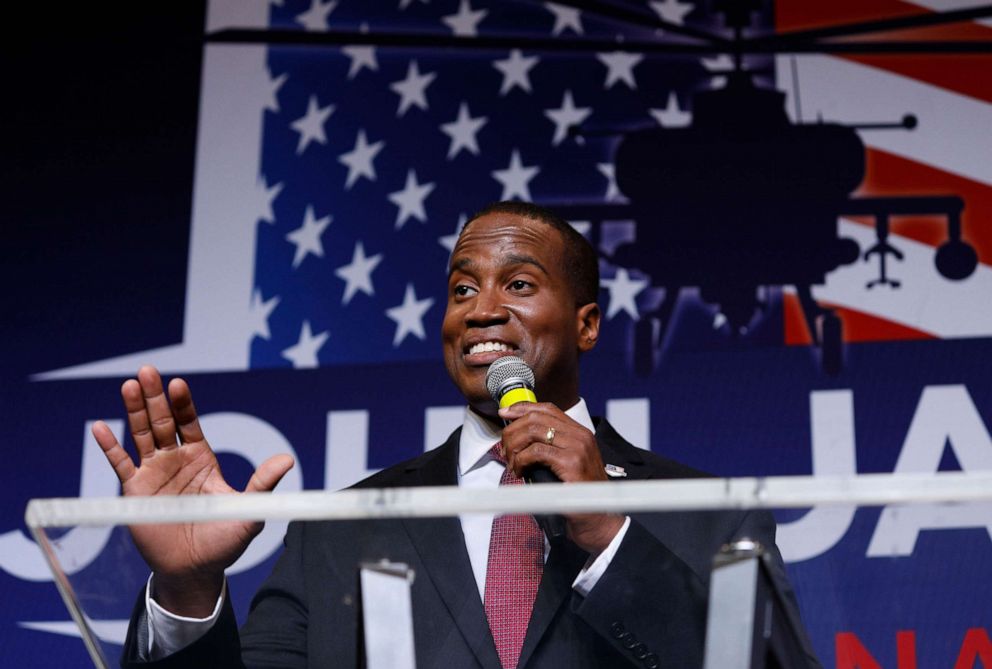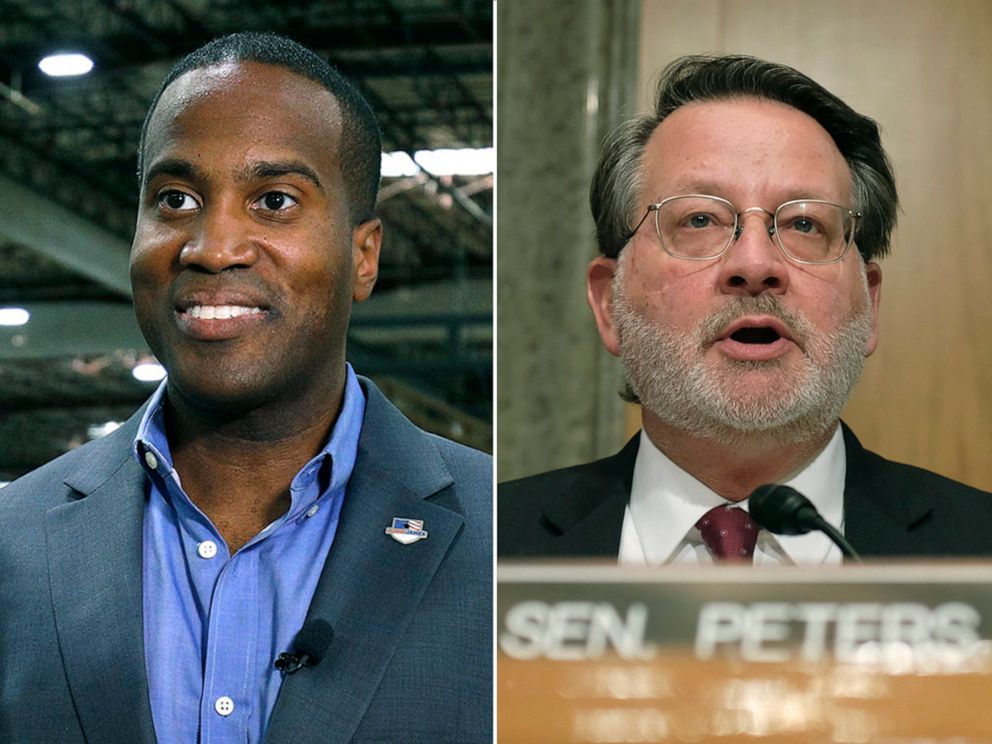How race is affecting the race for Michigan's Senate seat
John James is squaring off against Sen. Gary Peters for Michigan's Senate seat.
John James, the Republican Senate candidate in Michigan pursuing a challenge against Democratic Sen. Gary Peters, is navigating a delicate balancing act between being Black at a deeply introspective moment for the country on race and being a Republican on the same ballot as a president who repeatedly aggravates racial anguish.
Publicly, James is a loyalist to the Republican playbook, refusing to contrast himself with President Donald Trump or criticize him in any significant way -- in the hopes of shoring up support from Trump's base to capture a long-held Democratic seat. Privately, James has challenged the president, according to Politico, on issues ranging from funding for Michigan's Great Lakes to his "s---hole countries" remark, a comment Trump made in 2018 about countries in Africa.
James, 39, is not the only Republican straddling such a line.
"You cannot afford to be too Trumpy, but then again he can't afford to get too far away from Trump either," Jeff Timmer, a veteran GOP strategist and former executive director of the Michigan Republican Party, said in an interview. "It's this Kabuki dance that candidates have to do."
But in his second endeavor for political office, he is the lone Black Republican running for the Senate in the fall.
As Trump contends with growing unpopularity, which has been exacerbated by his response to the public health crisis and his handling of racial unrest in the country, James, a former Apache combat helicopter pilot in Iraq, is pushing to make the race only about him and Peters, instead of in the context of Trump.

"I think all I can do is be myself ... I'm in this position because someone fought for me, someone marched for me," he said in an interview. "I know what it feels like to be pulled over and fear for my life and wonder if this is the day that my son is going to see his daddy bleed out in the street. I know what it feels like to be in a car with my wife when somebody calls the cops because they perceive me as a threat."
His pitch is rooted in his "lived experience," which he says his opponent, who is white, can't replicate, and the idea of "helping others win" to unify the country.
For Peters, 61, a first-term senator, his re-election efforts have taken a backseat in the era of COVID-19 as he focuses on his job on Capitol Hill.
"Given the fact that we're in the middle of this public health crisis and economic crisis," Peters told ABC News in an interview on Friday, "there's the campaign in the backdrop but right now I'm focused on doing the best job I can as the United States senator."
James is attempting a second run for the Senate against Peters after a failed bid in 2018, when he lost to Sen. Debbie Stabenow by about seven points -- a more competitive showing than expected. For James, though, seeking to oust a Democrat in a state that has only elected one Republican to the Senate since 1972 -- when Spencer Abraham won the open seat in 1994 -- is no easy task.
Before Trump carried the state by the thinnest of margins -- about 10,000 votes -- the state was firmly in the Democrats' grip for two decades. Peters first won the seat in 2014 when he defeated Terri Lynn Land, a popular, well-funded Republican and former secretary of state, by 14 points. His triumph came during a wave year for the GOP, particularly in Michigan -- a feat in the battleground.
He is one of only two Democratic senators up for reelection this cycle in a state that Trump won in 2016, which put Michigan's Senate seat in the GOP's crosshairs in the hopes of retaining their majority. And James was a top recruit for Republicans, as a more seasoned candidate who could campaign on familiar terrain to flip the seat.
But the race itself has been upended by the coronavirus pandemic and the reckoning on race, as both candidates now look to elevate their respective records and pitch their campaigns as the one primed to lead Michigan through the unprecedented upheaval.
The proverbial elephant in the room: Race
Amid the debate on racial inequality, a pressing question comes to the fore: can Peters count on Black voters this time around when his opponent is Black? The race of a candidate doesn't inexorably infer support, and James isn't just black -- he's also a Republican.
Roughly 80% of African Americans self-identify as Democrat and there's a clear reason for that according to Dr. Leah Wright-Rigueur, associate professor of public policy at Harvard Kennedy School and author of "The Loneliness of the Black Republican: Pragmatic Politics and the Pursuit of Power."
"Black people associate the Republican Party with race and racism. As long as they believe the Republican Party to be racist, racially antagonistic or not working in the best interest of Black people, they will not support the Republican Party," she said. "It doesn't matter how much they like a Republican candidate."
And while the relationship between Black voters and the Democratic Party has been adversarial at times, some of the most important civil rights legislation and advances were a result of the Democratic Party.
While James' approach has largely been to broadly focus on collective issues -- those that unite Michiganders -- he is aware of the unique challenges faced by Black voters in his state.
"There are specific nuances that being an African American raised in Detroit I am aware of and in a better position to fix," he said.
Holistic issues like essential life skills, criminal justice reform, education, transportation and child care are concerns that he says he's committed to addressing.
"Sen. Peters has been in politics for 30 years, then in Washington for 10, and then the Senate for six and has not taken the opportunity to do so," James said.

Peters maintains that he's committed to change also. The list of reforms he's working on include voter suppression, police reform and health care modifications, which includes a plan to create a unit within the Federal Emergency Management Agency to specifically address underserved communities that are being disproportionately impacted by natural disasters, such as the coronavirus pandemic.
He said one thing is clear, that we will see that the coronavirus has impacted communities of color disproportionately.
"We saw here in Michigan, where an African American population that represents roughly 14% of the population ... yet over 40% of the deaths have been African American."
James is not known for bold or overly-charged conversations around race relations on the trail, but is this a strategy for success?
"For a Black Republican right now, particularly one that needs to win over Black voters, there has to be some acknowledgment of the significance of race," said Wright-Rigueur. "But it's also doubly hard because the standard-bearer of the party right now is saying the complete opposite."
It's a tightrope, and undoubtedly a challenge for Black Republicans like James, who says he wants "African Americans to have friends on both sides of the aisle." Is it possible for him to acknowledge and honor his personal identity and experiences without alienating his own party and white voters, who make up the majority of voters in the state?
"What Black Republicans find is that they are political minorities in their racial communities and racial minorities in their political communities," said Wright-Rigueur. "They are constantly trying to reconcile that, and often with little success."
While figures like Colin Powell and Michel Steele were successful, those triumphs don't happen easily or often -- and both are anti-Trump Republicans, underscoring the heightened difficulty of attaining such an achievement in the era of Trump.
Trump's divisiveness on race lingers over James' campaign, particularly after he vigorously embraced the president last cycle.
In 2017, in his initial response to the violent, white surpemacist rally in Charlottesville, Virginia, the president said there are "very fine people on both sides." In July 2019, Trump told the members of the "squad" -- four American congresswomen of color -- to "go back" to where they came from. And more recently, after the death of George Floyd at the hands of a white Minneapolis police officer, which sparked nationwide demonstrations, Trump smeared protesters as "thugs," and said "when the looting starts, the shooting starts," echoing a phrase first used by a Miami police chief that civil rights groups have widely condemned.
"My opponent supports Donald Trump, he has said, '2,000%,'" Peters said. "That's a pretty big percentage to support somebody and certainly on a variety of issues, there is a clear difference between where I am ... and where my opponent is."

The Trump factor is hard to ignore in an election that appears to be entirely about Trump -- and it's one that makes it "impossible" for James to be "truly competitive," Timmer, a vocal Trump critic who is also a senior adviser to the Lincoln Project, said. If he were advising James, he said, the West Point graduate should be "bold" to set himself apart from Trump as an independent voice on issues where it's clear where the public stands, such as on postponing of the election, deploying federal troops in the streets or on the Russia bounties.
So far, he's been too careful, Timmer said.
A look to November
Both James and Peters ran unopposed on Tuesday. The Associated Press called the primary races for both candidates once polls closed statewide.
"Gary Peters is an underestimated, very good politician. He doesn't necessarily stand out. He's not a charismatic politician, but he's an inoffensive kind of politician," Timmer asserted.
James currently trails Peters by double digits, according to recent polling. But he still believes it's a "challenger's year" -- although he would have to outperform Trump -- who is lagging behind former Vice President Joe Biden in the same poll.
Political experts in the state see Peters as someone difficult to paint with the progressive, socialist brush since he has military experience and a pragmatic demeanor and reputation.
Before entering the Senate, Peters served in the U.S. Navy Reserve, and later in the state legislature before narrowly losing a statewide election for attorney general by less than 5,000 votes. He's also represented Michigan in the U.S. House, winning election in two different congressional districts, the 9th and 14th.
Still, the James campaign is looking to do just that, writing about him in a campaign news release that he has a "30-year ineffective record as a liberal political hack."
Democrats are seeking to focus on James' vacillating support for Trump, while tethering him tightly to a sinking president.
"The truth is James is 'all for' Trump's agenda," a recent memo from the Peters campaign marking 100 days until Election Day read. "He's just a typical politician who will talk out of both sides of his mouth and won't be an independent voice for Michigan."
But at the end of the day, the national forces interfering in the race might ultimately tip the scales, rather than the candidates themselves.
"John James is a very good candidate running in a very bad year, same as 2018," Timmer said. "James ran further ahead of the top of the ticket and defied gravity more so than (Beto) O'Rourke in Texas ... (he) has an extraordinary profile but he has an exceptionally bad sense of timing."
For the GOP, 2018 was "a generationally bad climate" and "2020 is looking worse," he added.



